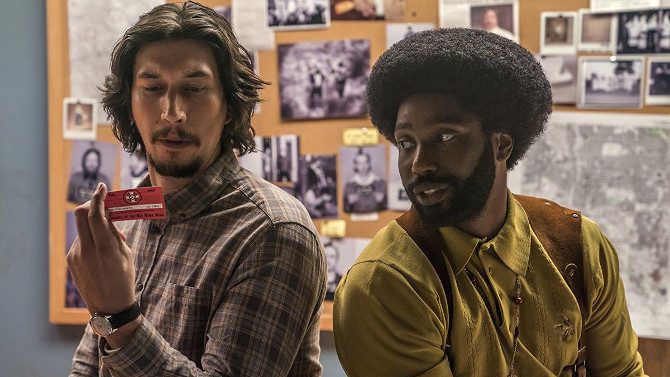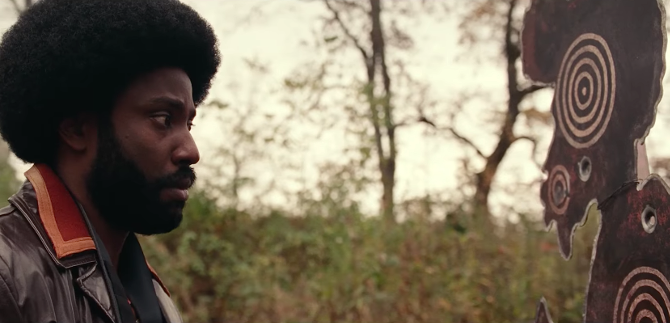It is hard to fathom that Spike Lee is now forty years into his film making career – and it has taken exactly that long for one of his motion pictures to earn a nomination for an Oscar for Best Picture, or Best Director for that matter (though he has been given an Honorary Award from the Academy). His first nomination came for his ‘Brooklyn cultural clash of love and hate’ screenplay for 1989’s Do the Right Thing, and it is no surprise that 2018’s BlacKkKlansman (which has earned six noms, including three for Lee – Picture, Director and Adapted Screenplay) holds a similar microscopic lens to the tensions smoldering just below the surface in the United States.
At times excessive and over the top in its style, it is no surprise when you look at the time frame that the screenplay covers. Set in the early 1970s, it is a time of black and white thinking, radical movements such as the Black Panthers, the Ku Klux Klan, and even the police taking sides. . . the grey milieu forced to either side as cultures clash, as anger simmers to a boil, as times they are a changing.
Set in Colorado Springs, the Police Department has just hired their first African American officer, Ron Stallworth (John David Washington – Denzel’s son), a man who will need to have thick skin – as many of his fellow policemen, as well as the populous, are racist. Finding himself in the shrinking grey milieu mentioned above, he has one foot in a profession that does not want him (but he is hoping that he can slowly change things and make a difference) and one foot within his own cultural community.
Asked to gather intelligence on the Civil Rights movement (that has some Black Panther leaning personnel), a speech is being given by an activist socialist organizer, Kwame Ture (Corey Hawkins), and Stallworth cozies up to Patrice Dumas (Laura Harrier), the president of the Black Student Union who has invited the illustrious speaker to the event.
Trying to make a connection with the woman over time, the officer also begins to work on a surveillance operation looking into local members of the Ku Klux Klan. Putting on his ‘white voice’, he creates a bond (over the phone) with Walter Breachway (Ryan Eggold), the president of the chapter. Asked to meet some of the members, the black man is in a crux, thankfully, fellow detective Flip Zimmerman (Adam Driver), is willing to play Stallworth in person. . . another officer, Jimmy Creek (Michael Buscemi – Steve’s brother), also helps with the investigation.
Gaining the trust of Breachway and dimwitted Ivanhoe (Paul Walter Hauser – who was fabulous in last year’s I, Tonya), it is second in command Felix Kendrickson (Jasper Pääkkönen) that must be watched – a wild card extremist, he is extremely suspicious of the new recruit. While Zimmerman works his magic in person, Stallworth does the same on the phone, sweet talking the Grand Wizard of the KKK, David Duke (Topher Grace).
An intense, powerful story (based on true events), but not without some Spike Lee touches of comedy, it speaks to the same issues charging the air today. . . though it also illustrates how far we have come. With its two opposing sides, it is fascinating to watch Stallworth try to navigate both of them. Played with both swagger and stoicism by Washington (he is definitely his father’s son), he must run two undercover operations as he slowly falls for the lovely and strong-willed Dumas. As the two sides speed toward a crushing collision, it is fascinating to watch the humanity of the man – does he risk one or both of his investigations to keep his girl safe. . . can he walk the tightrope between these two very polarizing groups in order to bring forth some change. . . can he stand idly by as Zimmerman risks his life (a Jewish man playing a black man pretending to be a white supremacist – a risky proposition)??? And, along with this final question, it is also worth mentioning Driver’s performance – a layered, nuanced, complicated and very human portrayal.
There are also two cameos, one from Alec Baldwin, the other from Harry Belafonte – both intriguing and memorable moments, it is especially exciting to see a legend like Belafonte tell such a powerful story (recounting the lynching of Jesse Washington).
Another nice touch finds Spike Lee referencing numerous blaxploitation flicks from the time (from Shaft to Pam Grier pics), as well as the silent epic The Birth of a Nation, while BlackKklansman opens with a shot from Gone with the Wind, the dynamic sometimes racist pop culture history of film ultra present and multi-faceted in the lifeblood of the narrative.
A based on true events story, BlacKkKlansman is an important watch – connecting so flawlessly to issues rearing their ugly head presently. Though there are some flaws along the way, and it may be a tad heavy-handed for certain viewers, you cannot deny the intensity of its undercover story, its seventies style, and its hard-hitting message. And though this film may paint a very black and white picture, don’t wave the white flag of surrender, enjoy it and all of its colourful visuals and kaleidoscopic anecdotes – for there is always hope for a meeting in the middle.



